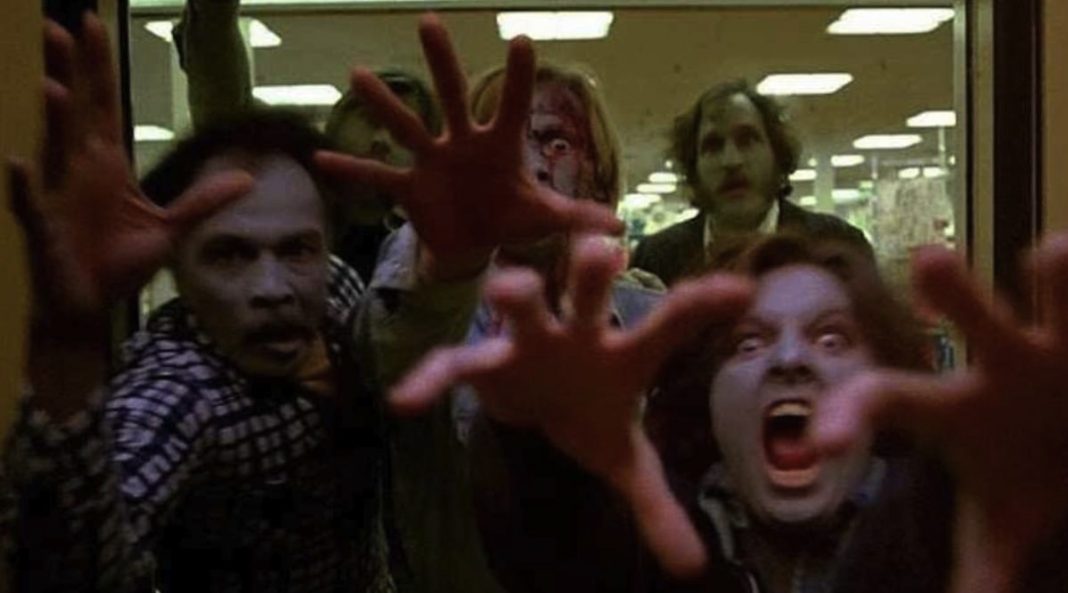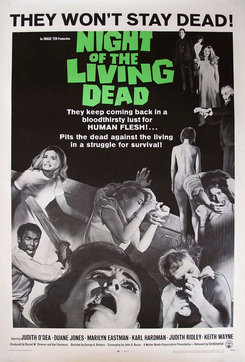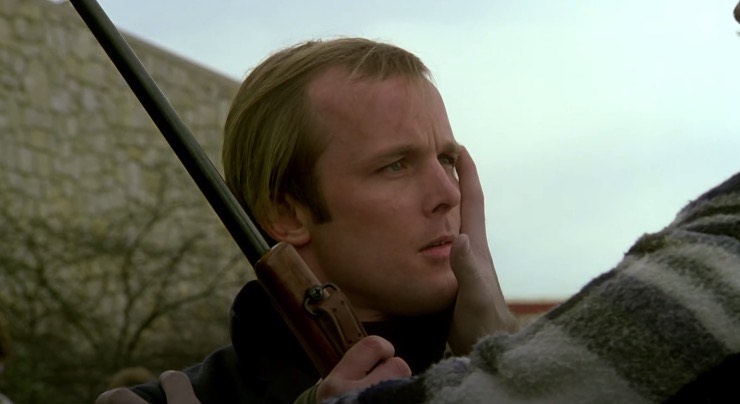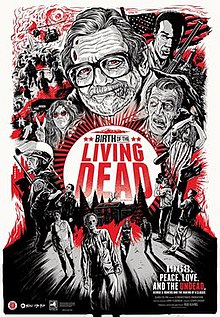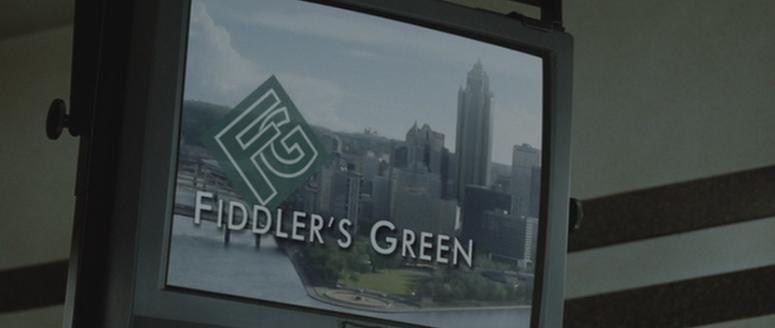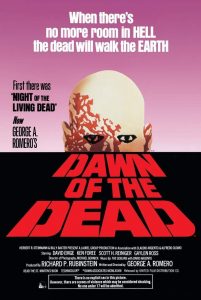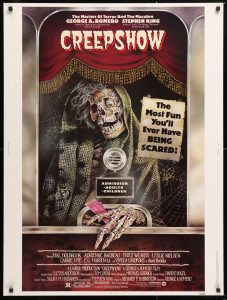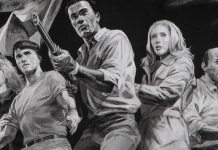What is it about the movies in George A. Romero‘s Dead cycle? They won’t stay dead! Here at Stately Beat Manor, we decided Halloween was the perfect season to discuss the class-and-captialism ravaging zombies! They’re coming to get you, reader… In our Romero roundtable!
Does everyone have a favorite Dead movie?
RICARDO SERRANO DENIS: It’s a very close call for me, because Night of the Living Dead is not only the one that started it all, but it’s also very much a movie about its time. There’s no way to separate it from race violence in America, Vietnam, and the Kennedy assassination. On top of that, it’s a great horror movie with expertly paced scares and a cast that gets the movie down perfectly. And yet, Dawn of the Dead is my favorite. It has some of the best zombies (the nun zombie and the Hare Krishna zombie!) of the trilogy and the gore is just so messy and bright!
DEANNA DESTITO: I lean toward Night. The way it is shot…the grainy black and white. Very creepy.
BILLY HENEHAN: It’s a toss up between Night of the Living Dead and Dawn of the Dead for me. It usually comes down to which of the two I saw most recently.
DEANNA: The vibe in Night is different to me than later films.
BILLY: Yes, I agree completely.
RICKY: You can kind of see that Romero put everything on Night, not thinking of a trilogy.
GREGORY PAUL SILBER: I’m a newbie to the Romero films. I saw Night of the Living Dead for the first time just a few months ago, and binged all 5 of the rest of the series in the past few days in prep for this roundtable. But Day of the Dead was my favorite. It’s the least like a horror film, but had the most compelling drama and sharp social commentary.
DEANNA: Day definitely has a lot to “say.”
AVERY KAPLAN: It’s a very close call for me – but I think I have to ultimately choose Dawn. On top of some of my favorite zombie scenes, it has some of my favorite lines in the cycle, and the soundtrack is incredible. The music that plays when Roger is about to get bit near the trucks is ingrained in my brain!
RICKY: I still have dreams with the mall muzak.
GREG: Dawn is the funniest, which works really well in its thematic favor.
AVERY: There’s moments when the zombies staggering around the mall in Dawn that always make me laugh out loud. The one that falls in the fountain, for example!!
BILLY: Part of the reason I love Dawn so much is how much time I’ve spent in the Monroeville Mall. Up until a few years ago, there was an even a zombie museum located inside there. My wife’s family is from Pittsburgh, and we usually stay in Monroeville, so I make a point go to the mall every trip. I even have a bloody old school MM logo Monroeville Mall t-shirt.
Who has a favorite zombie (from any of the movies)?
RICKY: That’s one of the hardest questions I’ve had to answer in recent years. Favorite zombie. For as brief a time as he’s on screen, I just love Barbara’s brother (Russell Streiner) as a zombie at the end of Night of the Living Dead. The first time I saw the movie and he came up on-screen my heart jumped! I was like “No, it’s Johnny and he’s come back dead!”

Plus he looks so…dead. Blood running down his head from the wound at the beginning. And the way he puts his hand on the doorframe to push in and bite his sister. There’s a nightmare guaranteed for tonight.
AVERY: I think my favorite zombie is Tom Savini’s Biker. You see the character die in Dawn and he returns as a zombie in Land. What a hero’s journey!!
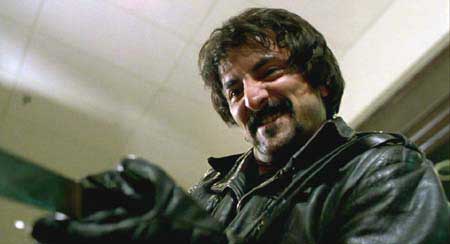
GREG: That cameo made me so happy!

DEANNA: Karen (Kyra Schon) in Night freaks me out.
AVERY: With that weird music cue, too…
DEANNA: And the part where she’s just gnawing away…. blech!
RICKY: By the way, Night‘s score is severely underrated. Yes, the Goblins’ soundtrack for Dawn is legendary, but Night has some creepy sounds that stand on their own.
GREG: Anyone remember this blink-and-you’ll-miss-it moment from Dawn? A zombie puts his hand on Trooper’s face, and instead of looking like he’s going to tear his flesh off, it almost seems gentle? Tender? Trooper even seems to appreciate it for a beat until he punches the zombie in the face. It goes on a nanosecond too long to seem unintentional! Could it be a comment on how hard it is to find intimacy in a zombie apocalypse?
BILLY: Awww, zombies need love too.
DEANNA: Undead dating is rough, man.
AVERY: That “zombie touch” is such a weird, memorable moment, especially when you consider it with some of the stuff we learn about zombie interiority in Day!
GREG: My headcanon is that those two dudes were dating before the world ended.
AVERY: Poor Roger. And then he gets shot in the head before they can reunite as zombies!
GREG: Oh, I hadn’t thought of that.
RICKY: I agree with you, Avery. Remember in Dawn when Francine is behind the protective glass at the front of the store? The nun zombie walks away and reveals a young guy in his baseball uniform sitting down on the ground, looking like he just missed his game? That stuck with me. Is there no zombie baseball?
GREG: There’s a zombie in football gear in Day, so zombie football may be a thing too.
What is everyone’s favorite living character?
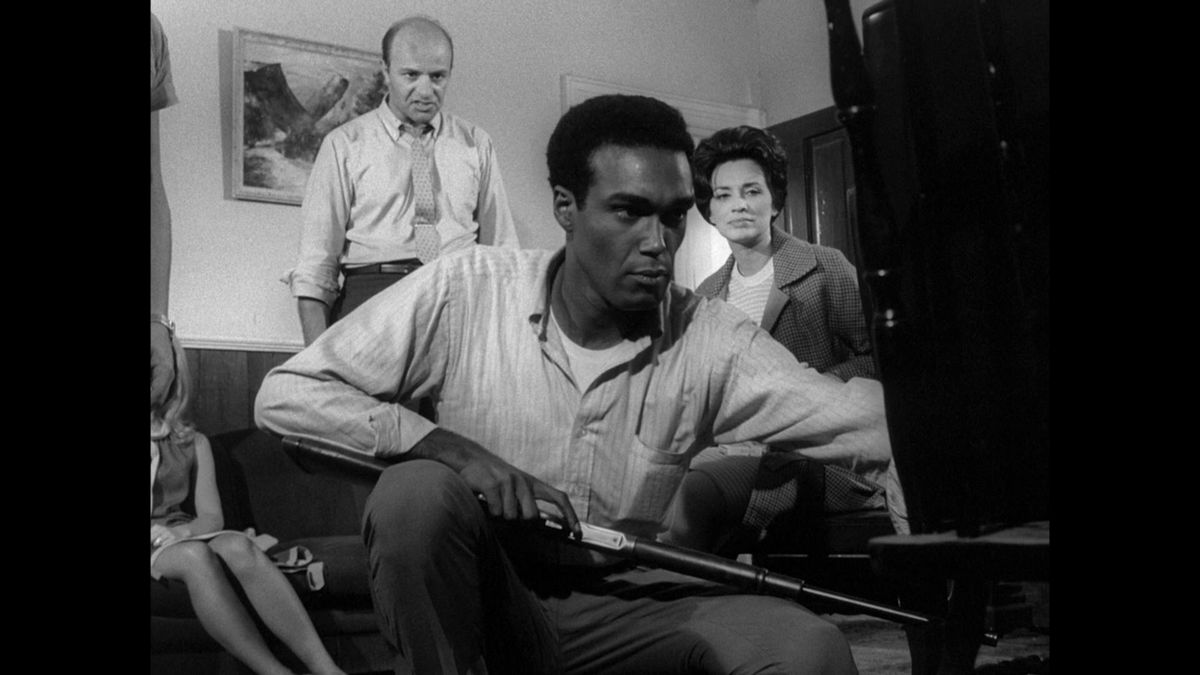
RICKY: Easy. Ben (Duane Jones) from Night of the Living Dead. He punches Cooper (Karl Hardman) in the face. The rest of his heroics is just a bonus.
BILLY: Ben, for sure. Though Savini as the maniacal Biker in Dawn is my second favorite.
DEANNA: Ben definitely.

GREG: I think I have to go with Peter (Ken Foree) from Dawn. He’s so level-headed and kind, but it’s fascinating how by the end, he was so emotionally and physically exhausted that he was ready to kill himself. Plus, I love that moment where he prepares a private, romantic dinner for Fran (Gaylen Ross) and Flyboy (David Emge) to enjoy together. Such a powerful moment of selflessness.
AVERY: His dynamic with Roger (Scott H. Reiniger) is really interesting, too. Rewatching Dawn, I was struck by how Roger is basically looking for Peter even before he meets him – in the first scene we see Roger, he tries to bond with another cop (who dies) before meeting Peter.

AVERY: I think my favorite living character is Sarah (Lori Cardille) from Day. The way she holds it together waaaaay past most everyone else is appealing to me here in the disaster that is 2020.
GREG: You also have to appreciate Sarah desperately trying to keep everyone else from losing their minds, which ultimately proves futile.
AVERY: Yes, that’s one of my favorite parts of Sarah’s character, especially the way the other characters resent her for it! She’s trying to help and her boyfriend mocks her for maintaining her composure!
RICKY: I have to say, McDermott (Jarlath Conroy) and John (Terry Alexander) have a great friendship in Day of the Dead. It comes across as genuine and it looks like they really care for one another.
AVERY: That’s true about McDermott and John, and it’s interesting how accepting they are of each others’ flaws (rather than resentful of them). Like, McDermott’s drinking could have been an issue, especially as he’s the pilot, but it’s never really raised as a problem.
RICKY: They seem to know how bad things are and how essential they are being that they’re helicopter pilots. Like, they’re a bit too confident at times, but they’re likeable. John only wants to soak up some sunshine! And McDermott wants to be there with him!
GREG: So much of these movies is about people desperately trying to hold onto the few relationships they have left.
AVERY: Yes! And it’s interesting how sometimes those relationships are so positive & other times they are essentially a death sentence. I think the fact that McDermott and John’s philosophy ultimately carries the Day is really telling as to what Romero thought the best-case scenario could be!
RICKY: Yes! It’s like Romero’s prescription for good times in the Apocalypse is to go to the beach!
DEANNA: I mean, when there is so little left, beach it is!
GREG: That final shot even suggests there are no zombies on the beach!
DEANNA: It’s like, it’s the edge of the earth. You can’t survive in the water so the beach is the last stretch of land to hold onto.
GREG: Land ends on a similar note. Those characters are convinced they’ll be safer “up north.”
RICKY: Yeah, until you watch Land of the Dead and realize zombies can walk under water. Then the beach isn’t looking so great.
DEANNA: Haha true! But they don’t know that.
GREG: But Land arguably ends more optimistically! With the leader of the human crew and the zombie head honcho acknowledging mutual respect for each other.
RICKY: That took me a bit by surprise. All of the other movies end on a pessimistic note. Romero seems to be interested in letting the audience know that it can get really bad if we don’t sort our stuff out. Not that he thinks we’re all doomed already. It’s more like a warning. An extreme cautionary tale.
Almost every movie in the Dead cycle has an arresting last scene. Which is your favorite?
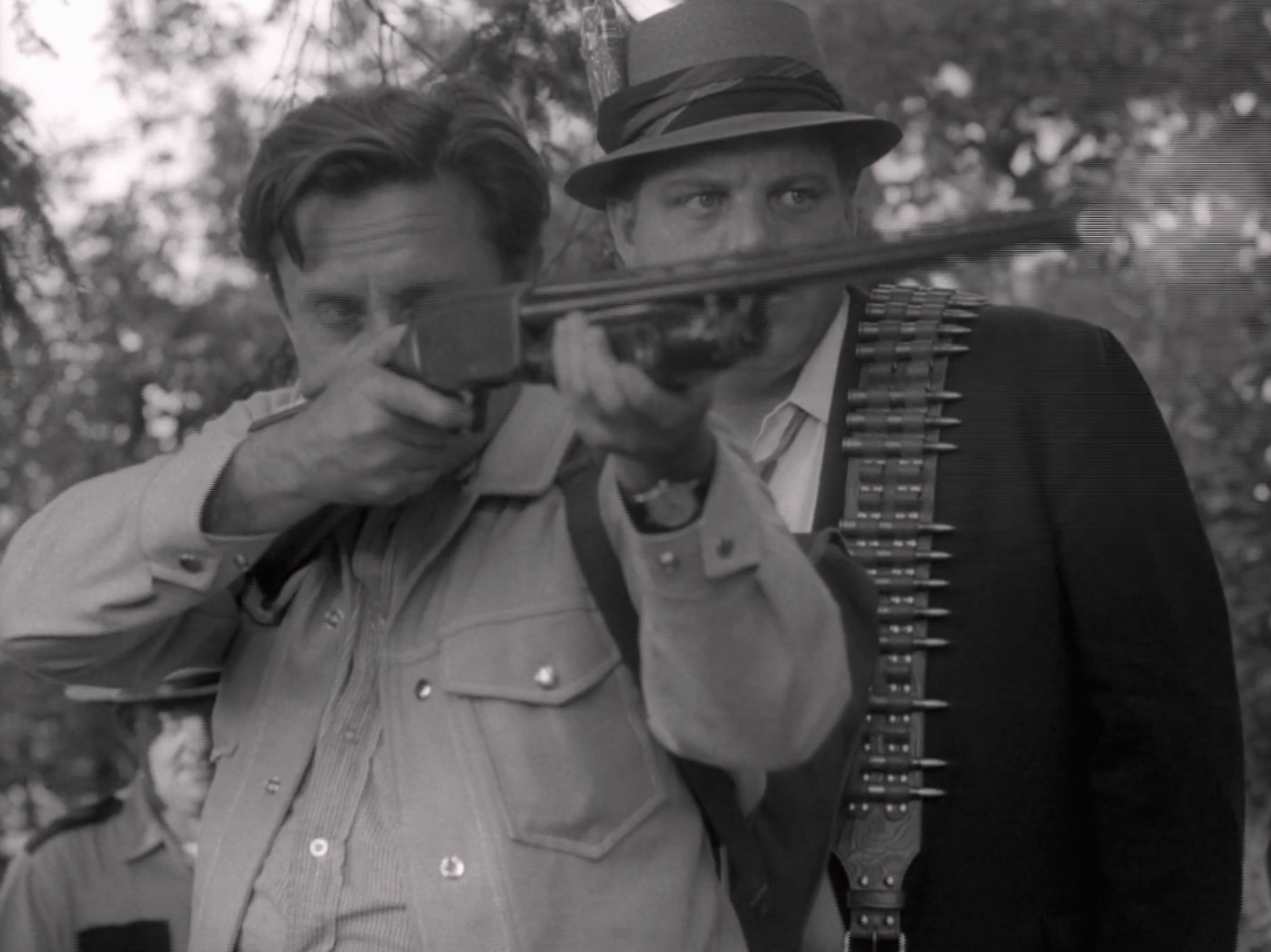
DEANNA: I’m going to sound like a Night purist with all my answers… but Night.
RICKY: But Deanna! Night doesn’t have Peter karate kicking his way to a helicopter!
DEANNA: I mean, that is spectacular.

AVERY: I agree with Ricky: these movies are meant to be warnings! And I think he may have best communicated this point with the final shot of Survival: two old rich white men pointing guns at each other & pulling the trigger, even after they’ve ruined everything that was worth fighting over in the first place.
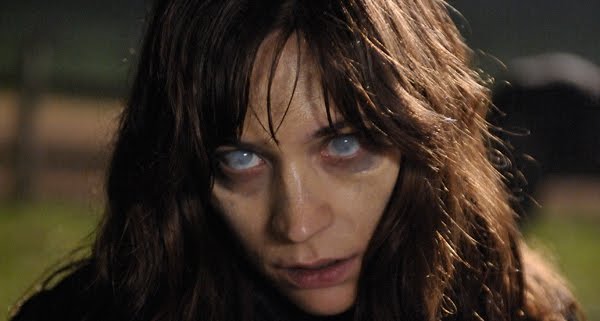
GREG: Survival (and the whole franchise incidentally) ends with a great final shot. What a metaphor for the foolishness of war: two zombies dueling each other with empty pistols.
RICKY: That’s the thing with Romero. Every movie has a striking image or scene at the end. I love that in the ending of Dawn, for instance, there’s this quick sequence where a zombie holding a rifle grabs Peter’s machine gun and keeps it, leaving the rifle behind. It’s like one last wink at the audience to see if they got the consumerism metaphor. In Night it’s when Ben finds the keys to the gas pump in the cellar, after the zombies have stormed the house.

AVERY: Diary has those zombie eyes, still moving even though the top of the head has been removed. Pretty powerful image to put at the end of a movie about journalism…
RICKY: True. The final 20 minutes of that movie Romero reserves for giving the audience a good look at human cruelty despite there being a zombie apocalypse in motion.
AVERY: The movies generally look pretty poorly on anyone who relishes doling out violence to the undead, don’t they? As soon as you see the militias in Night you get the sense that something is off, even though those characters might be the heroes of a different kind of zombie story.
GREG: Like a lot of my favorite horror, the villains of the Dead movies are not the more literal monsters. Sure, the zombies are scary and dangerous, but they’re more a force of nature. Humans are unpredictable. You never know how cruel they can really get.
DEANNA: The excessive force from authority like the militia are definitely not made to feel heroic. I mean, their trigger happiness takes down the one survivor in Night. Obviously there is a whole bunch of subtext there. They see a Black man and shoot. I mean. Walking dead… not about zombies…
GREG: I read something recently about Romero claiming that he didn’t write Ben with the intention of casting a Black man, and that that actor simply gave the best audition. But it’s impossible to watch that movie without thinking about the racism subtext.
RICKY: That’s true. There’s a great documentary on the making of Night, called Birth of the Living Dead (Dir. Rob Kuhns) where that gets mentioned. I think the actor, Duane Jones, has also spoken about it. Although, he agrees that his casting immediately gives the movie that racial subtext and that it might not have even been there if Ben were white.
DEANNA: That’s interesting. It works so well and is very timely for when the movie was made. And now of course but for the ‘60s. Big impact!
GREG: I have to wonder if parts of the script were rewritten to drive home the race subtext once Jones was cast.
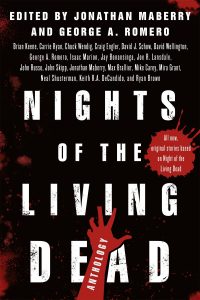
RICKY: Yeah, there’s no way Ben didn’t die at the end, regardless of skin color.
GREG: Either way, Romero clearly was aware of the potent metaphor he’d created in basically inventing the zombie genre as we know it, and continued to explore that social commentary from different angles throughout the rest of the series. If Night is about the dangers of racism (among other things), I think Dawn is about consumerism, Day is about militarism, and Land is pretty boldly anti-capitalist.
AVERY: Oooh that’s a really excellent distinction to make between Dawn’s anti-consumerism & Land’s anti-capitalism!
RICKY: I agree Greg, Land is as anti-capitalist as Romero gets in these movies. The whole thing with the big shiny and safe city and then the crammed and dirty place the workers live really drives the point home.
GREG: The title is quite literal too. It’s all about how physical space is used in the zombie apocolypse, and the villain (Dennis Hopper) is a ruthless landlord.
RICKY: I especially like one of Land‘s final zombie sequences where the zombies break into the safe zone and start eating all the rich people. It doesn’t get any clearer than that. All that was missing was Aerosmith’s “Eat the Rich” song playing in the background.
GREG: George A. Romero really said “eat the rich. Devour their brains.” Not to mention the frank discussions of how the wealthy class feeds off of the labor of the working class.
AVERY: The whole storyline for Cholo (John Leguizamo) where he has “pulled himself up by his bootstraps” by working for the ruling class only to find himself denied entry is especially damning.
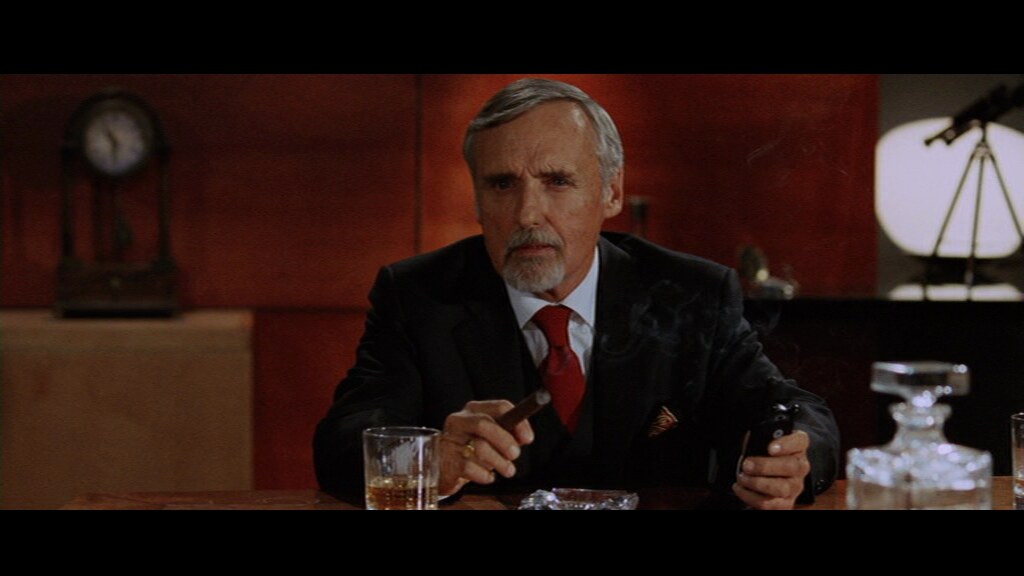
GREG: It also circles back to Night‘s racial commentary in that regard. Even in the zombie apocalypse, there’s still housing discrimination.
AVERY: Definitely. I’d even go so far as to say a recurring theme throughout the cycle seems to be that even given the opportunity to create a better world from a fresh start, there are those who will try to immediately re-establish current systems of oppression.
DEANNA: It’s the “humans never learn” thing. Every chance to make it right, we drop the ball. Even in extreme circumstances where working together literally means survival, there are people who just refuse to change.
RICKY: The new trilogy does mirror the original one in many respects. Like Greg said, Land and Night share some of that oppressed groups theme, Diary of the Dead is a gets a bit more specific with the metaphor being about journalism whereas Dawn goes consumerism, and Survival and Day both share the militaristic/war discussion.
AVERY: I think the major distinction between Day and Survival is that Day is military & Survival is private parties, but considering Day was made in the 1980s and Survival was in the late 2000s I think that tracks with shifting resources & power structures in the United States.
GREG: I do think it’s worth clarifying that Diary isn’t broadly anti-journalism. It’s more about the way our media infrastructure alters our view of reality by making things at once more comforting and titillating, and we’re all willing participants.
RICKY: Oh I agree, but it does give journalism a good spanking. But Diary is about the early 2000s in my opinion. All of it. From the War in Iraq to the media’s news blitz to the rise of social media. Romero was really concerned about America back then!
GREG: I wish more people were… If you’re asking “Greg, are you really saying we could’ve avoided Drumpf if more people studied Romero’s zombie movies?” my answer is… yeah probably.
AVERY: I think it’s meaningful that Diary is about “amateurs,” too. The idea of “untrained” journalists being the best way we’re getting information was disturbingly prescient!
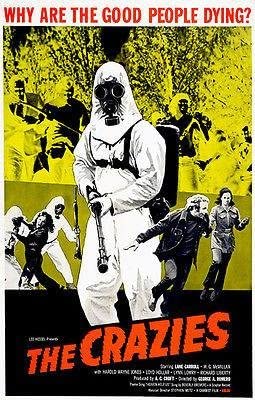
RICKY: Anyone here seen Romero’s The Crazies?
AVERY: I have seen The Crazies, I actually watched it back in early April, during lockdown. It was terrifying.
RICKY: The Crazies could’ve easily been a different perspective of the origins of the zombie apocalypse. That one’s more about how military bureaucracy collapses on itself and how little prepared we are to deal with a full-blown crisis. It’s a COVID-19 horror movie decades before COVID-19.
AVERY: Yes, I’m hoping our real-life story has a happier ending, though!!
Which movie in Romero’s Dead cycle is the most watchable?
RICKY: As much as I love Night, the one I can see back to back endlessly though is Dawn of the Dead, with Day being a close second.
DEANNA: I’m obviously going to pick Night but Dawn would be my second. I get into Dawn more than Day.
AVERY: I think Land! Romero really runs with the budget and gives a really expansive view of the Dead world. Plus, while Romero is never really subtle with his commentary, this one really drives it home. “We don’t negotiate with terrorists” is used verbatim in Hopper’s dialogue!
GREG: I’ve seen each of them only once so I can’t speak to rewatchability, but Day was the one where I had the hardest time looking away. Night and Dawn are more aesthetically interesting, but the suspense and human drama of Day was magnetic.
RICKY: I think Night is just too heavy. Dawn and Day have their funny bits to break the tension. Hell, Dawn has a pie fight! But Night is serious from start to finish. I also think Night is the most downright bleak.
DEANNA: Night is definitely the heaviest. If i’m going for full out creep, Night wins. Dawn‘s camp makes it easy to watch on repeat.
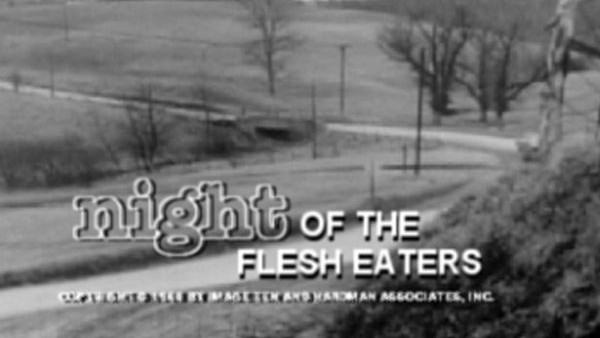
RICKY: Another one of the movie’s “mistakes” was its copyright oversight. The film’s distributors, The Walter Reade Organization, forgot to put the copyright indication on the prints. Which is why Night is public domain.
AVERY: One has to suspect that because of the copyright snafu, Night must be the most-watched, right?
RICKY: Avery, Night has a colored version no one approved. It’s horrible. It has new scenes filmed yeaaaaaars after the original. It hurts the eyes
GREG: I have to believe that contributed to Romero’s anti-consumerism/anti-capitalism becoming more prominent the rest of the series. So many people were watching that movie and he lost out on so much money for his own pocket! It must’ve been demoralizing.
AVERY: It’s kind of funny to think that in trying to save a few bucks by airing a movie that they didn’t have to pay for, broadcasters helped make Romero’s anti-capitalist zombie series so widely beloved!
RICKY: That could very well be, Greg. Then again, Italian horror director Dario Argento took Romero with him to Italy and paid for almost everything so he could finish the Dawn script.
AVERY: I wonder if part of Romero’s difficulty in securing funding came from not having the proof that Night was a major earner.
RICKY: He’s certainly spoken against the studio system and how executives get most of the money over the actual filmmakers.
AVERY: True, and he definitely made an effort to try and amplify new and marginalized creative voices (and still does, through the George A. Romero Foundation).
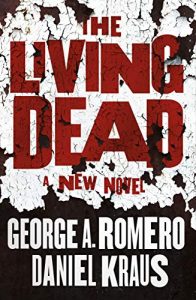
AVERY: Yes, but I recognized it only when I re-watched Diary (& the rest of the Dead cycle) as soon as I finished the novel! I would definitely recommend the novel, by the way. Kraus details the creative process in the afterword (so I won’t say too much about it), but it really does Romero’s long-standing plans for a Dead novel justice.
Which non-Romero zombie story is your favorite? And, if you’ve seen any, which non-zombie Romero movie is your favorite?
DEANNA: Non-zombie, I love the ’80s Creepshow, which I didn’t realize Romero directed until recently. I’m a Walking Dead fan. Even though the show went a little wacky and did some crazy changes, I still like the concept. And of course Shaun of the Dead, which I guess is a parody but still.
AVERY: Romero liked Shaun so much that Simon Pegg and Edgar Wright cameo in Land, and Pegg cameos in Diary, so I think that’s fair game! I love Creepshow too, especially considering my love for Stephen King and Joe Hill (who both appear on-screen in the movie). But I think my favorite is Season of the Witch – it’s got one of Romero’s perfect last shots! As for non-Romero zombie movies, I saw Blood Quantum on Shudder earlier this year and was absolutely floored. I really appreciated how it used the zombie metaphor in a such an illuminating way, which is strangely absent in so many ostensibly Romero-influenced stories!
GREG: I think I have to go with TRAIN TO BUSAN, which is incredibly intense and full of surprises for people who think they’ve seen it all from zombies. The Girl with All the Gifts also had a brilliant spin on the genre, honoring Romero’s legacy with thematic richness. That said, I’ve never really been into zombies before my Romero binge this week! Remember the early 2010s when zombies were EVERYWHERE in pop culture? I got so sick of them that it’s taken me until basically just now to actually be interested in zombie stories.
DEANNA: There was definitely an oversaturation. I stepped away from it for a while because it was too much. I needed a new creep.
GREG: A similar thing happened with vampires around the same time. “Are you a vampire or zombie” was the most pressing question on the internet circa 2011.
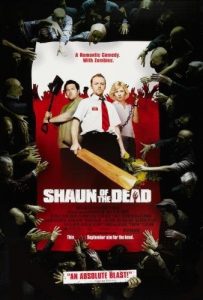
GREG: What do you think of Zack Snyder’s 2004 Dawn of the Dead remake?
RICKY: Greg…I would say that I don’t hate the Dawn remake. I just think it doesn’t say nearly enough about anything as opposed to the original. It’s definitely more style over substance. That said, it has good zombie action. And it has good characters.
DEANNA: The phrase Zack Snyder triggers me.
GREG: I mean, same. “Doesn’t say nearly enough about anything” describes his entire filmography, but I caught parts of that movie on TV in my teens and it definitely left a mark on me. It doesn’t hold a candle to the original, of course, but it’s fascinating to me that he skipped right to Dawn rather than remaking Night. I realize there is a Night remake, too, but nobody seems to talk about that anymore, while the Dawn remake seems to have remained in the public’s memory.
AVERY: Yeah, I do think it has some memorable images, but overall, it doesn’t have the same depth as Romero’s. I wonder if that’s why it’s proven more memorable (the images)? Or if it’s more just that Snyder’s continued presence has kept it in mind.
GREG: This might sound NUTS, but perhaps Snyder’s work is more widely praised and discussed than is merited.
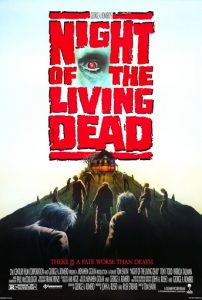
GREG: I didn’t even realize there was a Night remake until last night when I was reading up about the original, so you’re intriguing me.
RICKY: I will say, Aftershock Comics is currently publishing a great zombie comic called Dead Day, by Ryan Parrott and Evgeniy Bornyakov, in which the dead rise for one day a year from sunset to sunrise to see their families and friends…and enemies. It’s one of the most original zombie stories in years.


